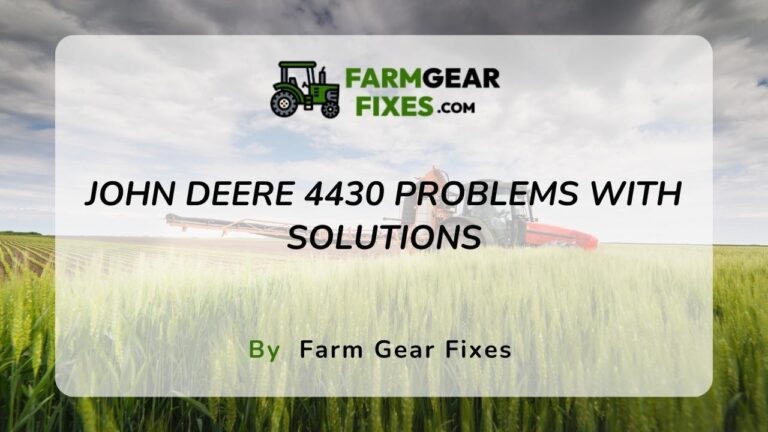6 Common John Deere 2038R Problems (Solutions Included)

Are you experiencing issues with your John Deere 2038r tractor but don’t know where to turn for solutions? Look no further. In this informative blog post, we will explore common problems that owners of the John Deere 2038r may encounter and provide expert solutions to help get your tractor back up and running efficiently.
From engine troubles to hydraulic system malfunctions, we’ve got you covered with the knowledge and expertise you need to tackle any issue head-on. Don’t let a small problem turn into a big headache – arm yourself with the information you need to keep your John Deere 2038r running smoothly.
John Deere 2038R Problems and Their Solutions
Before going into the specific problems and solutions for the John Deere 2038R, it’s important to understand the common mechanical issues that owners may encounter with this model. From engine troubles to transmission complications, being aware of these potential issues can help in preventing and resolving them effectively.
1) Engine Problems
Fixes for engine troubles on the John Deere 2038R may include addressing issues with overheating, loss of power, or unusual noises. Regular maintenance such as checking and changing the oil, inspecting the air filter, and ensuring proper fuel quality can help prevent these issues.
In addition, addressing any leaks, inspecting the cooling system, and verifying the condition of the belts and hoses can also contribute to maintaining the engine’s performance.
2) Transmission Problems
On the other hand, transmission complications on the John Deere 2038R may involve issues with shifting, slipping, or strange noises during operation. With proper maintenance, such as checking the transmission fluid level and quality, inspecting the clutch, and ensuring proper adjustment of controls and linkages, many of these issues can be prevented.
Additionally, addressing any leaks and conducting regular inspections of the transmission system can contribute to the overall performance and longevity of the transmission.
With the right knowledge and proactive maintenance, many of these common mechanical issues with the John Deere 2038R can be effectively managed, allowing owners to enjoy reliable and efficient operation of their equipment for years to come.
Hydraulic Problems and Solutions
Now, let’s discuss the potential hydraulic problems that can arise with the John Deere 2038R and their corresponding solutions. The hydraulic system is a critical component of this tractor, and understanding how to troubleshoot issues can save you time and money in the long run.
3) Hydraulic System Failures
System failures in the hydraulic system can manifest as slow or unresponsive movements of the loader or three-point hitch. This can be caused by air in the system, low hydraulic fluid levels, or a faulty hydraulic pump.
To address these issues, start by checking for leaks and topping up the hydraulic fluid to the proper levels. If the problem persists, it may be necessary to bleed the system to remove any trapped air, or to inspect and potentially replace the hydraulic pump.
4) Troubleshooting Leaks and Pressure Issues
Failures in the hydraulic system can also present as leaks or pressure issues. Common areas for leaks include hydraulic hoses, connections, and seals. If you notice any signs of leakage, it is important to address the issue promptly to prevent further damage.
Use a piece of cardboard to pinpoint the exact location of the leak and inspect the affected areas for any damaged components. Additionally, if you experience pressure-related problems such as erratic movements or difficulty lifting heavy loads, it could indicate a clogged filter or a worn-out hydraulic valve.
Regularly inspect and replace filters as needed, and consult a professional technician to diagnose and address any valve issues.
The hydraulic system is a complex and crucial part of the John Deere 2038R, and it is important to address any issues promptly. By regularly inspecting for leaks, maintaining proper fluid levels, and troubleshooting pressure problems, you can ensure the optimal performance and longevity of your tractor’s hydraulic system.
Electrical Problems with Solutions
To ensure the smooth operation of your John Deere 2038R, it is crucial to be aware of common electrical challenges that may arise. From starting and charging system malfunctions to operator interface and sensor problems, addressing these issues promptly can help prevent costly repairs and downtime.
5) Starting and Charging System Malfunctions
To maintain the reliability of your tractor’s starting and charging system, it is important to regularly inspect the battery, alternator, and starter for any signs of wear or malfunction.
Common issues may include difficulty starting the engine, dimming headlights, or slow cranking. If you encounter any of these symptoms, it is essential to promptly diagnose the root cause and address it to prevent further damage to the electrical system.
For optimal performance, ensure that all electrical connections are secure and free of corrosion. Additionally, regularly testing the battery and alternator can provide insight into their health and prevent unexpected failures.
6) Operator Interface and Sensor Problems
For the smooth and efficient operation of your John Deere 2038R, it is crucial to address any operator interface and sensor problems that may arise. Common issues may include malfunctioning gauges, error codes, or unresponsive controls.
These problems can impact the overall performance and safety of the tractor, making it essential to promptly diagnose and resolve any operator interface and sensor issues.
Sensor calibration and regular inspection of wiring harnesses and connectors can help prevent operator interface and sensor problems. Proactively addressing these issues can ensure accurate data monitoring and prevent potential performance issues.
Maintenance and Service Tips
Your John Deere 2038r requires regular maintenance and service to ensure optimal performance and longevity. By following these maintenance and service tips, you can prevent potential problems and keep your equipment running smoothly for years to come.
After all, proper care and maintenance are essential for maximizing the efficiency and reliability of your John Deere 2038r.
Regular Maintenance Schedules for Optimal Performance
One of the most important aspects of maintaining your John Deere 2038r is following a regular maintenance schedule. This includes regular oil changes, filter replacements, and inspections of key components such as the engine, transmission, and hydraulic systems.
It is also important to conduct routine checks on your equipment’s tires, brakes, and electrical systems to identify any potential issues or wear and tear. By addressing these issues proactively, you can prevent larger, more costly problems from arising in the future.
Best Practices for Long-Term Equipment Care
Practices such as storing your equipment in a dry, clean environment and covering it when not in use can help protect it from corrosion and rust. Long-term care also involves greasing and lubricating moving parts to reduce friction and wear, as well as inspecting and replacing worn-out components as needed. By implementing these best practices, you can extend the lifespan of your John Deere 2038r and minimize the need for major repairs.
LongTerm equipment care also involves proper handling and storage of fuel, as well as regular inspections and cleaning of the cooling system. By paying attention to these details and taking a proactive approach to equipment care, you can ensure that your John Deere 2038r remains in top condition for years to come, saving you time and money in the long run.
Conclusion
Upon reflecting on the common problems faced by John Deere 2038r owners, it is evident that many issues can arise in the operation of this tractor. However, with proper maintenance and following the recommended solutions, these problems can be effectively mitigated.
Whether it’s addressing transmission noise, hydraulic issues, or electrical malfunctions, some steps can be taken to resolve these issues and keep the tractor running smoothly. By staying informed and proactive in addressing potential problems, John Deere 2038r owners can ensure that their equipment remains in top working condition.






